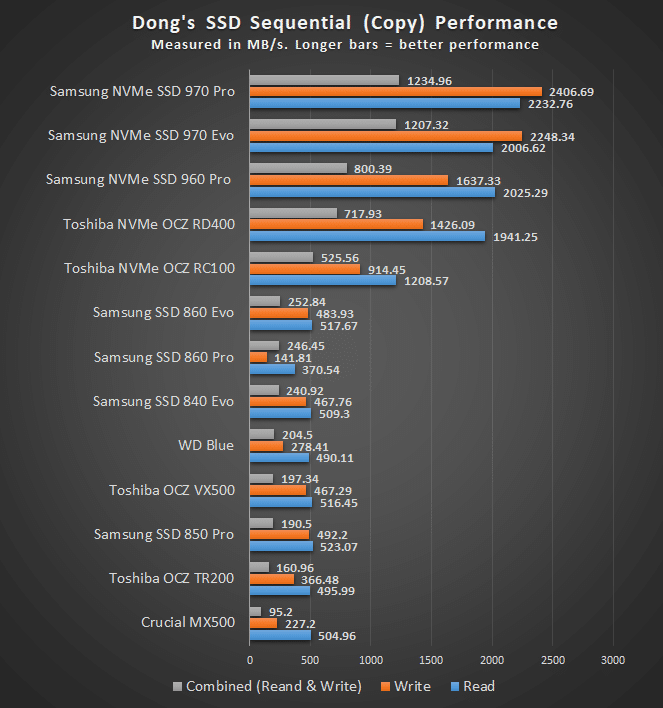The Toshiba RC100 is tiny, slightly larger than an SD card, and affordable, costing just around 30 cents per gigabyte. In fact, with it, you now can get an NVMe SSD for less than the cost of a SATA SSD. And while you won’t get the best NVMe speed, the new SSD’s performance still easily beats that of any SATA counterparts.
If you’re looking to upgrade your desktop computer or a laptop with an M.2 slot, Toshiba’s new RC100 is quite a great deal, despite its fair share of shortcomings.
Dong’s note: This SSD has now been discontinued and is generally no longer available for purchase. For modern alternatives, follow this link.

Toshiba RC100: A tiny NVMe SSD for the budget-minded
The RC100 is like no other retail NVMe SSDs on the market. Coming in the M.2 2042—20mm wide and 42mm long—the drive is just half the size of most other contenders, like the Samsung 970 EVO.
The drive uses Toshiba’s 64-layer BiCS3 3D TLC NAND flash memory and a generic controller that doesn’t have a name. This controller is stacked on top of its memory cells to afford the drive its super-compact form factor.
The tiny size translates into its modest specs, however. The RC100 is an NVMe SSD that uses two PCIe lanes (x2) instead of four. As a result, it has just half the theoretical speed of any x4 NVMe drive, including Toshiba’s RD400, which came out two years ago. What’s more, the SSD has no DRAM cache memory either, which would help boost its performance.

In return, this is one of the most affordable SSDs you can find. Its 240GB and 480GB capacities currently cost just around 30 cents per gigabyte. That’s cheaper than even some SATA SSDs, the Samsung 860 Pro, for example, costs some 10 cents more per gigabyte.

Easy to use, M-key and B-key support
What’s most interesting about the RC100 is the fact that it features both M and B keys, allowing it to fit in an M.2 M-key (NVMe) slot as well as an M.2 B-key (SATA) slot.
In other words, you can use it with any laptop computer that has an M.2 slot, regardless of which type. The RC100 also works with most existing desktop computers, including those without an M.2 slot, via an adapter.
In my test, the drive appears supported by Windows 10’s native driver, just make sure you use version 1607 (released in 2016) or later. This means you can install fresh Windows on it just like you do with a standard SATA hard drive. I could also migrate a computer from a standard SATA drive to the RC100 without any problem at all.

Good endurance
The Toshiba RC100 has decent endurance, including a three-year warranty with a 0.45 drive write per day (DWPD) rating. In other words, you can write up to some 45 percent of the drive’s capacity per day and every day, and it will last for three years.
Specifically, if you get the 480GB capacity, the daily amount you can write to for three years straight is about 210GB. Obviously, the less you write, the longer it’ll last. Most of us don’t write more than 10GB per day, and some days, we don’t write anything at all.
While the Toshiba RC100’s endurance is not the best I’ve seen—the Samsung 970 Pro, for example, has more than double its endurance –, the drive has more than enough writes for any average user.
Satisfying performance
Considering the RC100’s modest specs, I didn’t expect it to outdo any other NVMe drives in performance, and it didn’t. It was indeed the slowest NVMe SSDs among recent drives, all of which feature x4 PCIe.

Nonetheless, the RC100 drive proved to be faster than all SATA SSDs I’ve worked with, including the Samsung 860 Pro. In fact, in copy tests, its performance more than doubles that of even the fastest SATA drives.
In random access tests, the difference between the RC100 and other SSDs wasn’t as acute, but the pattern remained: It was still faster than all other SATA SSDs.

In real-world usage, the RC100, though slower than other x4 NVMe drives, still delivered satisfying performance. The test computer booted up fast, in less than 10 seconds, and applications launched quite speedy.
Keep in mind that I tested the drive using an M-key M.2 slot, meaning the drive performed as an NVMe drive. If you use it with a B-key M.2 slot, however, expect its performance to be the same as that of a regular SATA SSD.
Conclusion
The Toshiba RC100 is an interesting SSD whose affordable pricing more than makes up for its lack of performance. The truth is, you’ll only miss the performance of a full x4 PCIe NVMe drive if you have a high-end computer.
If you have a computer with modest specs or one that’s a few years old and still running on a regular hard drive, the RC100 hits the sweet spot. It’ll make an excellent upgrade that gives you a lot for your money.




where can i buy the 480 gb capacity version? I can only seem to find the 240 gb version.
Interesting. I guess they’re running out of inventory. Wait awhile! 🙂